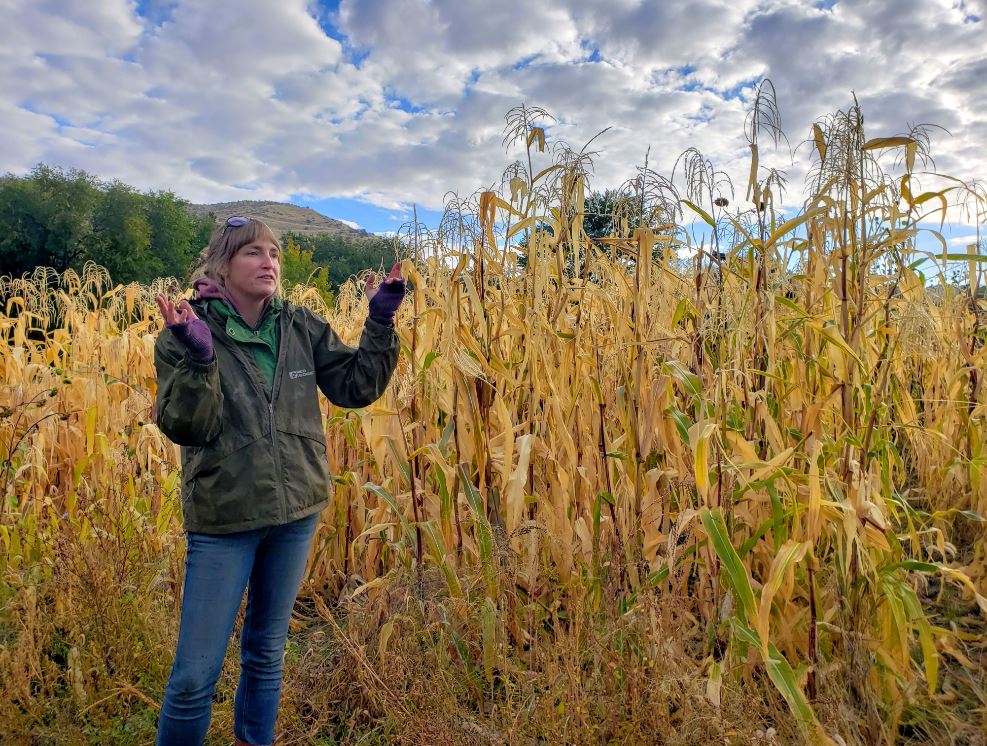
Taylyn Cogswell | staff writer | [email protected]
Throughout recent years, Boise State has integrated a variety of classes, from University Foundations to Honors Colloquium that tackle the topic of sustainability and the prioritization of environmental health within the modern world to discuss the first steps to the reformation of outdated business models and incite the first waves of change for a more sustainable future.
A blended community of Boise State professors, student organizations and leaders of the local farming movement are each taking part in sharing solutions for making Boise a region that can effectively replenish its levels of consumption in agriculture, water and energy.
In early October, a Boise State Honors Colloquium instructed by Stewart Gardner ventured to a local farm in Northwest Boise called Earthly Delights, led by Boise State alumna and self-proclaimed “seed freak” Casey O’Leary. This farm sits nestled behind a cul de sac sharing its property with the Draggin’ Wing desert-plant nursery.
“How do we, as urban people, connect with agriculture?” O’Leary asked upon opening the tour.
From this question, O’Leary intended to set the precedent for a profound discussion about the connection between the environmental health in relation to bodily as well as economic health.
During O’Leary’s career as an undergraduate at Boise State University, she was an active member of a club called the Idaho Progressive Student Alliance (IPSA), which has since dissipated from campus. This club campaigned against the harmful effects of industrial agribusiness.
“Especially with the environmental activism, I felt like I was constantly running my head into a brick wall. Someone else was setting the agenda, and then I had to spend my life-energy trying to shut them down,” O’Leary said. “At some point, I realized I would rather just turn and run as fast as I could go in the direction that I think we should go and let someone else waste their energy trying to shut me down. We need the solutions. That’s how I came to farming; I felt like this is a solution-oriented thing.”
The Boise State Sustainability Club is an excellent resource for individuals looking for ways to begin integrating sustainability into their own lifestyles. Sophomore accounting major and financial advisor for the club, Mikayla Hubele, believes that the club is a great stepping stone for individuals to begin prioritizing ecological health.
“They’re trying to teach other students about sustainability and just kind of how we can all be sustainable,” Hubele said. “The garden that they have is an open garden and anyone can go and pick their own stuff.”
The campus club’s garden is located on a small property on Juanita Street, and during the peak of the season has a variety of foods available for picking including zucchini, squash and tomatoes.
In many ways, the club provides an excellent learning environment for the trial and error of home gardening and a hands-on introduction to the philosophy of sustainability, as well as the important balance that is to be achieved between production and consumption in the modern world.
Mari Rice, lecturer in the Environmental Studies Program at Boise State University, thoroughly enjoys teaching her classes to a variety of majors and sees the campus community continually offering up a myriad of classes on the topic of sustainability through the lens of multiple disciplines.
“We are definitely offering more classes on sustainability in general, and a lot are focused on food. But I see sustainability in economics, urban studies, global and environmental studies as well as engineering,” Rice said. “A lot of disciplines are jumping on this, and it is pretty amazing.”
Rice acknowledges the need for the population to reduce its impact on the environment, and that the concept of local agriculture is revolutionary to reforming our current system of producing, purchasing and eating food.
“Any class I teach, agriculture is the big thing that needs to change,” Rice said. “Almost all of our water used here in Idaho is used for agriculture; making it an area where there could be some major shifts towards sustainability. The more locally we can eat, the smaller scale we can eat at and can purchase items, then the more locally sustainable we can be.”
Finding solutions that combat the harmful environmental, health and cultural effects of the industrialized agriculture is a complex feat, one that requires individuals to exercise personal discipline and take measures with their own money and time to consciously minimize. To do so requires education on the concept of environmental studies.
“(Environmental studies) connect the human dimension with nature,” Rice said. “These complicated problems need to pull people from all disciplines to solve them.”
